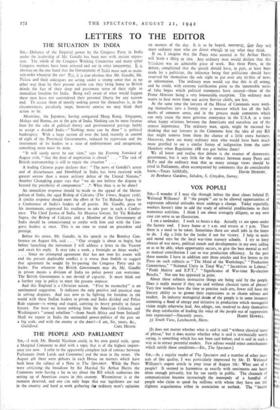THE PEOPLE AND PARLIAMENT
SIR,—I wish Mr. Harold Nicolson could, in his own genial style, spare a Marginal Comment to deal with a topic that is of the highest import- ance just now. I refer to the apparently complete lack of contact between Parliament (both Lords and Commons) and the man in the street. On August 4th there were debates in each House on matters which have both been the subject of a Note in The Spectator. While the Peers were criticising - the broadcast by Air Marshal Sir Arthur Harris the Commons were having a lot to say about the Bill which authorises the setting up of American courts in this country. Westminster is at the moment deserted, and one can only hope that our legislators are out in the country and hard at work gathering the ordinary man's opinions on matters of the day. It is to be hoped, moreonr, iiiat they will meet ordinary men who are direct enough IV say what they think. .If so, I imagine that the Peers who sneered at Sir Arthur Harris will learn a thing or two. Any ordinary man would declare that this b:Cacicast was an admirable piece of work. But three Peers, in the debate, complained that the speech should have, in part, at least been made by a politician, the inference being that politicians should have reserved for themselves the sole right to put over any tit-bits of news or information. The ordinary man would say that this is all wrong, and he could, with extreme justification point to the lamentable series of false hopes which political statements have created—those of the Prime Minister being a very honourable exception. The ordinary man wants to hear more from our active Service chiefs, not less.
At the same time the lawyers of the House of Corrunoris were work- ing themselves into a frenzy over a measure which has all the hall- marks of common sense, and in the process made comments which can only cause the most grievous annoyance in the U.S.A. at a time when happy relations between the Americans and ourselves are of the utmost importance. The ordinary man, again, might be excused for thinking that our lawyers in the Commons hate the idea of any Bill that might remove from them the chance of a little extra business. Moreover, there are many ordinary men who would have been much more gratified to see a similar frenzy of indignation from the same Members when Regulation 18B was put before them!
We all know and realise that debate is the essence of democratic government, but it says little for the contact between many Peers and M.P.s and the ordinary man that so many strange views should be aired in Parliament, often accompanied by comments that do considerable
harm.—Yours faithfully, DAVID MURPHY. 20 Benhurst Gardens, Selsdon, S. Croydon, Surrey.


























 Previous page
Previous page